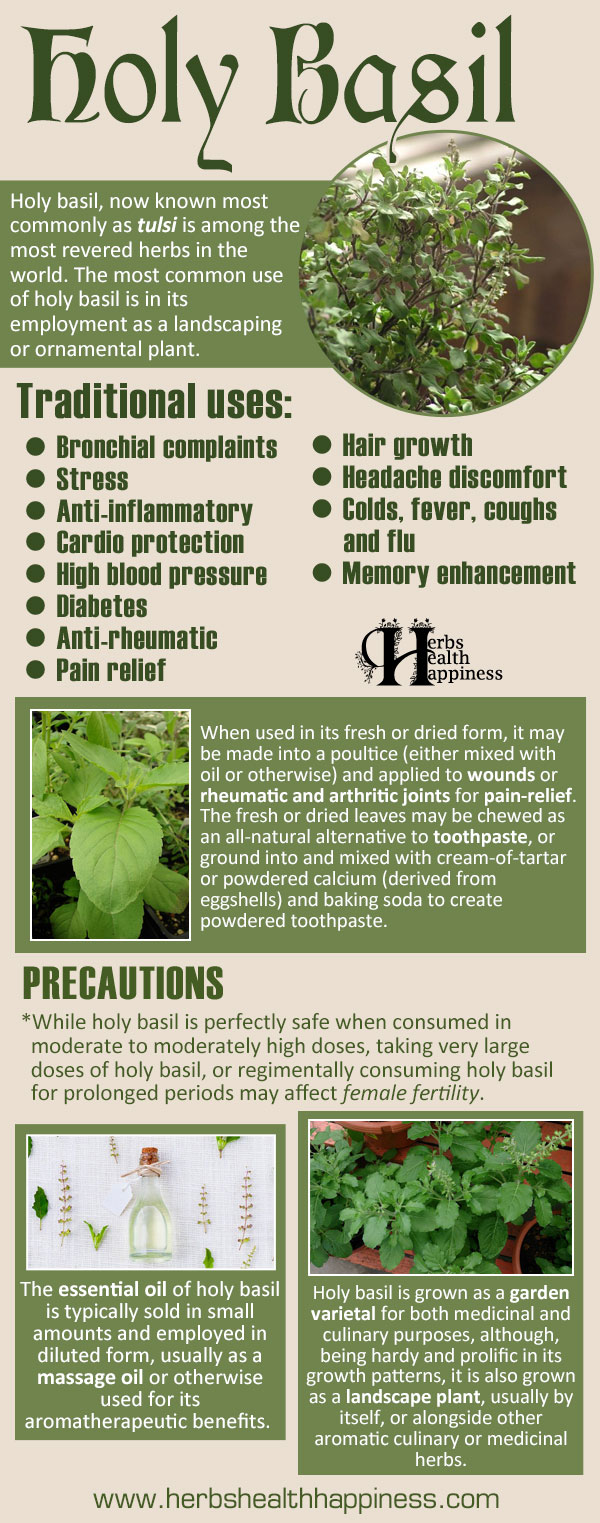Holy Basil

Holy Basil Uses and Benefits - image to repin / share
Infographic: herbshealthhappiness.com. Image credits: See foot of article

Holy Basil - Botany And History
Holy basil, now known most commonly as tulsi is among the most revered herbs in the world. Long-worshipped in India as a sacred plant (hence its name in English), tulsi is a variety of basil that grows chiefly in India where it is assumed to have first originated, although its profuse usage in Asiatic cuisine and alternative medicine since ancient times have allowed the herb to spread throughout much of Asia, especially in areas that have a strong Hindu or Buddhist influence. Within the sphere of Hinduism, holy basil is considered sacred or protected by a number of deities, and as such plays a very integral role in several Hindu rites and customs. Due to its sacred status, it is among the most prolific plants in India, being planted by long-standing tradition in nearly every household, but more so with specific Hindu sects such as the Vaishnavas. The plant is allotted a near-divine status throughout the whole of India that some Hindu sects even proffer unto it daily worship.
Holy basil is an intensely aromatic perennial shrub typified by its vastly encompassing, many-branched foliage and intensely palpable aroma. Measuring no more than sixty centimeters in length at the most, holy basil is characterised by its hairy stems, thin, slightly rough branches, and slightly dentated dark green, emerald green, or purplish leaves. Holy basil also sports inflorescence notable for being grouped in whorls of a typically red, purple, or ivory-hue. Holy basil is employed chiefly as a medicinal plant, and has been a staple in Ayurvedic medicine since ancient times, but due to its sacred status, it is also grown as a garden-variety plant in most Hindu homes and temples for esoteric purposes. While not commonly employed for culinary purposes in India due, again, to its sacred status, holy basil is employed elsewhere as both a medicinal and culinary herb. In areas where the influence of Hinduism or Buddhism is prevalent but not as stringent, holy basil is cultivated chiefly for culinary or medicinal usage, and only secondarily for veneration. In parts of Asia where Buddhism is not the predominant religion, holy basil is usually considered a weed due to its relative hardiness and its tendency to grow prolifically with little to no tending required. Given the initiative, holy basil will grow in almost any soil type, although it prefers mostly slightly moist soil types. [1]
Holy Basil - Herbal Uses
The most common use of holy basil is in its employment as a landscaping or ornamental plant, especially in Indian settings, where it is chiefly grown in temple courtyards or otherwise planted in special pots for households. These ornamental plants are accorded sacred status by locals and are actively cultivated, as several parts of the plant are employed in either ritualistic or medicinal purposes. Outside of areas influenced by Hinduism, holy basil is grown as a garden varietal for both medicinal and culinary purposes, although, being hardy and prolific in its growth patterns, it is also grown as a landscape plant, usually by itself, or alongside other aromatic culinary or medicinal herbs.
While nearly all parts of the holy basil have its own intrinsic use, the leaves are the most commonly employed part, both for medicinal and culinary purposes. Because of its intense aroma and very palpable flavour, holy basil leaves are often used in lieu of common basil for dishes that require its distinct fresh taste, as only very little is required to elicit a similar profile. For individuals who simply adore basil, the intensity of holy basil is an added gustatory treat. Its pungent aroma and telling flavour has made it a favourite in the creation of basil-based beverages (whether it be alcoholic or non-alcoholic varieties, with the latter being somewhat rare though not inexistent). Its lasting flavour is also what makes holy basil a prime choice for cooking dishes which require long cooking times, or dishes that are exposed to extremely high heat. Foodstuffs such as stews, stir-fries, and baked goods are markedly improved in taste with the incorporation of holy basil. Indian, Thai, Vietnamese, and some varieties of Cantonese cuisine all incorporate holy basil as either an integral ingredient or a key note in its range seasonings. [2]
Holy basil is generally allotted a near-panacea like status in the Ayurvedic system of medicine, to which literally hundreds of curative properties are ascribed to it, with remedies for nearly every possible bodily ailment. Holy basil leaves are typically used fresh, although dried leaves are just as popular (if not even more so) and is usually brewed into decoctions or allowed to steep via infusions like typical tea. Depending on the concentration, holy basil tea, which is just as popular as India's own famed black teas, possess a slew of health benefits. Moderate concentrations of the brew are commonly drunk as a general all-purpose beverage in place of the more commonplace chai (black tea), as it is known for its cooling, rejuvenating, and calming effect. Very mild concentrations of the decoction are typically cooled and vended during the summer seasons, while stronger decoctions likewise cooled are often marketed as all-natural 'soft drinks', or otherwise given to individuals who suffer from bronchial complaints or flu and flu-like diseases as a ready cure. [3] Very strong decoctions of holy basil tea are preferred by some and are usually made at home from home-grown fresh or store-bought dried holy basil leaves. These can be drunk as either a hot or cold beverage (usually before and after meals, to whet the appetite and improve digestion and nutrient assimilation), or otherwise employed for other healing purposes - usually as a topical rinse. Very strong decoctions of holy basil are often employed in lieu of chemical-based mouthwashes for the deodorization and sanitation of the oral orifices, since holy basil possesses extremely potent antiseptic properties. [4] When applied topically to open wounds or minor lacerations, it helps to stave off the possibility of infection as well as promote healing by preventing the growth of bacteria which hinder the mending of the injured area. Extremely potent decoctions of holy basil may also be employed as a hair-rinse to thicken the hair. Its antifungal and antimicrobial properties helps to keep the scalp healthy and protected from dandruff, while its active chemical compounds such as linalool, eugenol, and rosmarinic acid encourage hair-growth and protect it from parasites.
In Ayurvedic medicine, basil tea is known as the "elixir of life" and is noted for its amazing rejuvenating after-effects. It contains significant amounts of antioxidants that are beneficial in protecting the body against the ravages of stress; it also possesses anti-inflammatory, antidiabetic, cardioprotective, and adaptogenic properties, making it an excellent all-round curative drink. In India, it is drunk as a remedy for everything from the common cold to a curative drink for the treatment and management of high-blood pressure and diabetes. [5] A daily draught of holy basil tea is believed to energize the body and allow it to better cope with stress, thereby increasing its productivity through the enhancement of one's natural energy output, bolstered by its anti-stressant properties. [6]
When used in its fresh or dried form, it may be made into a poultice (either mixed with oil or otherwise) and applied to wounds or rheumatic and arthritic joints for pain-relief. The fresh or dried leaves may be chewed as an all-natural alternative to toothpaste, or ground into and mixed with cream-of-tartar or powdered calcium (derived from eggshells) and baking soda to create powdered toothpaste. Dried and allowed to steep in oil, it makes for an excellent anti-rheumatic ointment as well as a useful hair-oil said to improve and encourage hair-growth, as well as enhance memory and relieve discomforts associated with headaches.
Made into a tincture and consumed regularly in moderate doses, it serves to tonify the body and improve the overall function of the immune system through enervation. Properly maintained, a daily regimen of holy basil tincture is enough to sufficiently stimulate and strengthen the immune system so as to avoid 'run-ins' with most common diseases (i. e. colds, fever, coughs, flu), and even further protect the body against the risk of graver diseases. A tincture of holy basil may even help to protect the body against certain types of cancers and other types of degenerative diseases, although non-alcoholic formulations (i. e. plain holy basil tea), when consumed regularly, is also believed to promote the same effects in the long-run. Most Ayurvedic potions and medicines typically incorporate holy basil as a "memory enhancing" herb, said to help improve one's concentration, increase one's memory retention, and enhance one's innate capacity for mental recall and overall mental synapses. [7]
Holy basil can be employed in its fresh or dried state. Due to its popularity, aquaeous, alcoholic, and essential (steam-distilled) extracts have been made available in the general market, while dried holy basil tablets or capsules are also sold as food supplements. The essential oil of holy basil is typically sold in small amounts and employed in diluted form, usually as a massage oil or otherwise used for its aromatherapeutic benefits. Due to its potency, it is always used in diluted form, and only sparingly.
Holy Basil - Esoteric Uses
Holy basil plays a very integral role in the sacred practices of Hinduism, where it is considered a sacrosanct herb associated with many major deities. Nearly all of the "great" deities of the Hindu faith have holy basil under their protection, patronage, or personal use, although it is most commonly associated with Krishna, Vishnu, and Lakshmi. The common varieties (Ocimum tenuflorum) is typically ascribed to Vishnu or Krishna, while the purple-leafed varieties (Ocimum sanctum) is usually ascribed to either Lakshmi or Hanuman. Other varietals of holy basil are ascribed to other deities in the Hindu pantheon, so that there are local varietals that are referred to after their "patron" deity (i. e. Kali tulsi [after the goddess Kali]; Ram tulsi [after the god Rama], Shyama tulsi [after the god Hanuman]). The leaves of holy basil (or, in most cases, the whole plant itself) is revered as a type of 'avatari' or divine receptacle (specifically that of Vishnu or Lakshmi) throughout nearly the whole of India in as much as the cow is revered as the avatari of the god Brahma. [8]
Holy basil is so sacred to the Hindu religion that even the very soil where it grows is considered holy and auspicious (iterated in the Padmapurana: "For the leaves, flowers, fruits, root, branches, the body, and everything which is the Tulsi is sacred; even the soil upon which it flowers is holy", adding further: "Tulsi is sacred because Brahma resides in the roots, Vishnu resides in the stems and leaves, and Rudra [Shiva] resides in the flowering tops" [Padmapurana 24.2]). Ayruvedic texts further cement holy basil's sacred status in classifying it as a rasayana - a natural substance which nourishes a person's whole being and which promotes longevity and perfect health. This capacity is said to spring from the fact that holy basil possesses an energy called sattva (energy of purity) which it radiates throughout the whole being of whoever or whatever consumes it or comes near it. Because of this, holy basil is grown in common household and in temples in the belief that it protects the individuals that reside therein from all forms of harm both internal, external, and contrived (supported by the Padmapurana: "Wherever tulsi grows there is no misery. She is the holiest of the holy. Wherever the breeze blows her fragrance there is purity" [Padmapurana 24.2]). [9]
It is believed that holy basil was originally a devotee of Vishnu (named Tulsi) who, upon her death was reincarnated into the plant. Having found favour with Vishnu, she was gifted the honour of forever being associated with his praise and worship. Conflicting sources attest that Tulsi the devotee was actually a goddess in her own right, while others attest that she was either a handmaid of Lakshmi, or simply a mortal devotee of Vishnu. Alternatively, according to Vaishnava stories, holy basil was said to have sprung when the tears of the deity Dhavantari fell into a handful of amrita
Tulsi plays an integral role in many Hindu celebrations, but more so during Kartika (eleventh day of the waxing moon, twelfth month of Kartika, referred to properly as Prabodhini Ekadashi) in the ritual of Tulsi Vivah where a tulsi plant is decorated as though it were a bride and ritualistically married to the god Krishna. [10]
Monks, ascetics, mystics, and magicians of the Hindu faith also wear articles or items made from holy basil, the most common of which are japa malas (prayer beads) which are made from branches, stems, roots, or even the dried fruit of the holy basil plant. The wearing of these beads is considered highly auspicious and is said to grant the bearer health as well as protection from all malign forces. While malas may be made from any other item (i. e. metal, ceramic, bone, etc.) those which are made from parts of holy basil are considered the most powerful, so much so that holy basil beads are said to be "more precious than gems". Rarer still are holy basil fossils - literally petrified branches, roots, or even whole fruits of holy basil which are shaped, polished, and strung into beads. These fossils are doubly prized and highly coveted by devout Hindus, but due to their rarity, typically fetch a very high price in the market. [11]
Within the context of Western magick, holy basil is said to be a great attractor of luck and wealth. It is believed that carrying a sachet of holy basil leaves in one's pocket would attract money and never leave the bearer in want. Placing a pouch of holy basil leaves in a cash register or in any place where money is stored was also said to protect its contents from theft and bring about a smooth and profitable business. For practitioners of voodoo and hoodoo, holy basil is said to grant protection and attract love. It is either employed in the making of juju bags, gris-gris, or medicine pouches. Carried around one's person, it is supposed to protect one from harm and increase one's luck. Allowing holy basil leaves to steep in water for three days and using the infusion as holy water by sprinkling it upon a house's threshold is said to not only promote peacefulness throughout the household, but will also improve one's financial status and protect one's place from thieves and illness [12]
Powdered holy basil leaves, when sprinkled on the upper part of the body, especially over one's heart, is said to prevent one's lovers from straying. Sprinkling powdered holy basil over one's head or rubbing it over the forehead is said to confer protection to one's person, as well as to improve one's psychical abilities. [13] Brewed into a tea and given to a person right after an argument, it is said to promote an easy reconciliation. Burnt as an incense or planted at the threshold or within the parameters of a house, it is said to protect the area from all forms of malignancy.
Holy Basil - Contraindications And Safety
While holy basil is perfectly safe when consumed in moderate to moderately high doses, taking very large doses of holy basil, or regimentally consuming holy basil for prolonged periods may affect female fertility. It is advised to reduce one's intake of holy basil to a bare minimum when attempting to conceive, and to cease consumption of holy basil until the terminus of one's pregnancy. Holy basil is, otherwise, perfectly safe for daily consumption and use, although some people may experience mild allergic reactions when applying holy basil topically (in which case a routine skin patch-test is a must).
Holy Basil - Other Names, Past and Present
Hindi: tulsi / shyama tulsi /suvasa tulasi / sri tulasi / Krishna tulsi
Sanskrit: tulasi / maiyarika / ajaka / surasa
Bengali: babultulsi / tulasa
Thai: kraphao
French: basilic Indien / basilic sacre / basilic saint / basilic sacre poupre
Spanish: albahaca santa
English: holy basil / sacred basil / sacred purple basil / red holy basil / tulsi (adopted) / Indian basil / hot basil / green holy basil
Latin (scientific nomenclature): Ociumum tenuiflorum / Ocimum sanctum
References:
[1 - 2] https://en.wikipedia.org/wiki/Ocimum_tenuiflorum
[3] https://web.archive.org/web/20120919233825/https://organicindia.com/tulsi-facts.php
[4] https://organicindia.mercola.com/tulsi-tea.aspx
[5] https://hinduism.about.com/od/ayurveda/a/tulsibenefits.htm
[7] https://www.wildflowerapothecary.com/the-health-benefits-of-tulsi-tea
[8] https://web.archive.org/web/20121017212317/https://organicindia.com/tulsi-holy-basil-2.php
[9] https://www.ecoindia.com/flora/trees/tulsi-plant.html
[10] https://www.holy-basil.com/6865.html
[12 - 13] https://www.witchipedia.com/herb:basil
Main article researched and created by Alexander Leonhardt, Scientific Studies report by Dan Ablir.
© herbshealthhappiness.com
Infographic Image Sources:
Pixabay (PD)
https://en.wikipedia.org/wiki/File:Ocimum_tenuiflorum2.jpg
https://en.wikipedia.org/wiki/File:Starr_080117-1577_Ocimum_tenuiflorum.jpg
https://commons.wikimedia.org/wiki/File:Holy_Basil_(Ocimum_tenuiflorum)_1.jpg
(Creative Commons)


1. Famous Chef Sheds 60lbs Researching New Paleo Recipes: Get The Cookbook FREE Here
2. #1 muscle that eliminates joint and back pain, anxiety and looking fat
3. Drink THIS first thing in the morning (3 major benefits)
4. [PROOF] Reverse Diabetes with a "Pancreas Jumpstart"
5. Why Some People LOOK Fat that Aren't
6. Amazing Secret Techniques To Protect Your Home From Thieves, Looters And Thugs
7. The #1 WORST food that CAUSES Faster Aging (beware -- Are you eating this?)
If you enjoyed this page:



























